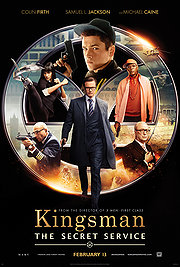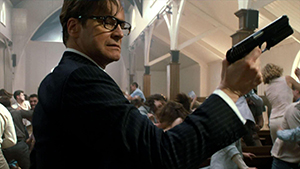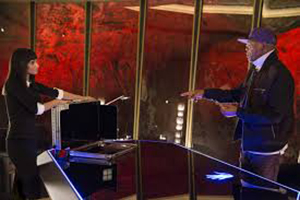This week, Dagger contributor Cliff Bugle joins Mark Elloff to review “Kingsman: The Secret Service.”
Based upon the acclaimed comic book and directed by Matthew Vaughn (Kick Ass, X-Men First Class), Kingsman: The Secret Service tells the story of a super-secret spy organization that recruits an unrefined but promising street kid into the agency’s ultra-competitive training program just as a global threat emerges from a twisted tech genius. (Synopsis by Fox)
-
Cliff’s Take
It seems that we as Americans often forget – or at least rarely acknowledge in public – just how much we have in common with the British. The Magna Carta was a significant influence on the U.S. Constitution. Robin Hood long been an adopted ideological icon for our lower class. And we wouldn’t have been able to steal the format for “American Idol” if the English hadn’t already invented “Pop Idol.” That last one is a tad embarrassing, but you get my point. Americans love to admire many of the same things that the British do, and the movie theater is as good a place as any to notice this fact.
The James Bond franchise, now more than fifty years old, is as British as wearing Gryffindor scarfs and spouting incoherent theories about “Doctor Who.” Yet the title character is considered an invaluable staple of American cinema. The strength of the franchise’s popularity is reflected in the fact that it’s been continually parodied in all corners of pop culture since at least 1967’s “Casino Royale.” Enter “Kingsman: The Secret Service.”
Vaughn’s iteration of the Bond archetype, based on the comic “The Secret Service,” recalls the secret agent’s many films of yesteryear (though not any of the Daniel Craig entries). It fawns over the franchise’s various beloved conventions, such as the impeccably tailored suits, cool gadgets, and megalomaniac villains. However, it conversely distinguishes itself from its source material by using a story template that’s just as recognizably British and beloved by Americans: the Arthurian legend. Spawned from the tale of King Arthur was the “unlikely predestined hero” trope that American audiences have been eating up since before “Star Wars.” This convention, while appealing to all ages, obliquely invokes the American Dream/rags-to-riches fantasy for adults specifically.
In Philip Gardener’s analytical book “The Bond Code,” it’s persuasively suggested that Ian Fleming wrote at least a few villains to represent unflattering parts of himself that he was trying to come to terms with. If Vaughn tried to carryover this idea to “Kingsman’s” main villain, a billionaire sociopath named Valentine (Jackson), then what characteristics of the conventional American adult, represented symbolically through the Arthurian protagonist named Eggsy (Egerton), is the audience supposed to be confronting? To answer this question, we needn’t look any farther than Valentine’s evil plan: to manipulate the global population into turning on itself through belligerent violence in an effort to dwindle humanity down to a size that Earth can accommodate. Like with most evil plans laid by Bond’s villains, there isn’t much nuance here.
-
Mark’s Take
There isn’t much nuance anywhere in the film, except perhaps among critics discussing the not-so-subtle double meanings written into the plot. Point in case is the excessive and yahooistic violence that goes beyond the bounds of even extreme action films. What the trailer can’t show you is the vast amounts of blood and limbs that go flying during the action sequences. While much of it is violent to the point of campiness, there comes a point at which it is brutality for its own sake. There’s metaphor, but you are going to be too caught up in the stylish hyper-violence to catch the message. This is “Clockwork Orange” on speed and without the intelligence.
Much of this violence is played off as dark comedy. Within the fight scenes the action borders on the impossible. Cameras slow down at the right moments to catch a humorous reaction to a thrown punch. There is a bizarre head-exploding scene towards the end that is reminiscent of the knock-out sequence in “The Big Lebowski.” Amusing? Yes, but also equal parts distracting from the climax of the film which is simultaneously occurring. These moments taking you away from the central theme of the film build up over time. It doesn’t make this a bad film, just an unbalanced one. Some moderation by the director on some of the stylistic elements, or an outside editor, would have helped clear the palette.
While the story of up-and-coming ruffian Eggsy was interesting as a plot device, the film leaves you wondering if there is going to be a “Kingsman” backstory sequel. The original Kingsmen are far more interesting characters, if only because we are given so little of who they are and what they are about. Other than some lofty goal of “saving the world,” their motives are mostly unclear. Same with the villain. Why is it that he is looking to decimate Earth’s population other than some vague notion of “saving the world?” Wait a minute? Are they both working towards the same goal?
This has always been the problem with Bond films, to an extent. The villain is typically a cartoon of an actual adversary. They are doing bad just to do “bad.” The later Bond films got away from this slightly, “Casino Royale” being the most noticeable deviation. The lack of relatable human motives detracts from the character’s ability to connect with us. Sure, we want to see Eggsy succeed (because class elitism or something), but not as much as we want Harry to succeed. Why? Because we are invested in Harry’s emotional connection to Eggsy’s father. The resonance is missing when the villain goes down at the end, because the wrong hero succeeds.
What is interesting is that this is a film which you may want to go back and watch a few more times. Not just because it is fun, but because there are a few layers here. They aren’t deeply hidden, but there are several messages about society and culture that are worth exploring. Or just stick around to see the heads roll.
“See It/ Rent It/ Skip It”: See it. All this over-analysis is wonderful, but is this movie worth your money? Sure.
THREE STARS out of four.
Directed by Matthew Vaughn
R (for sequences of strong violence, language and some sexual content)
Runtime: 2 hours and 8 minutes







Leave a Reply
You must be logged in to post a comment.